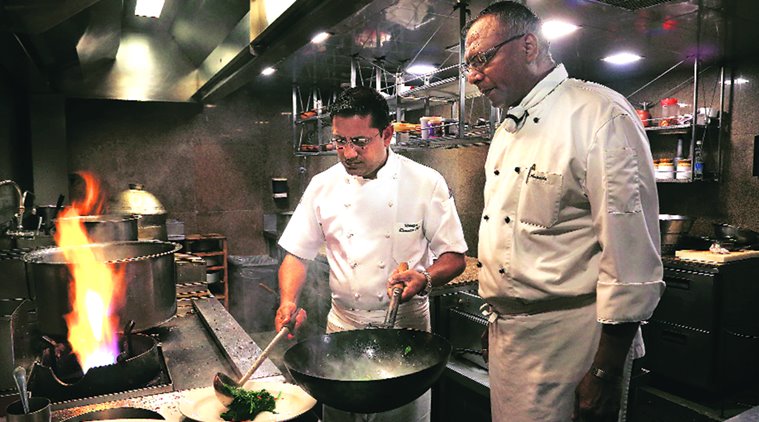The Spice of Life
As Ananda Solomon retires as the executive chef at Vivanta by Taj-President, he discusses his experiments in the kitchen and the changing culinary landscape of India.
 Ananda Solomon with Uddipan Chakravarthy.
Ananda Solomon with Uddipan Chakravarthy.
Accompanying his grandmother for spice-shopping in Mangalore as a child, chef Ananda Solomon never imagined that he would spend over 30 years serving the high table. Having started his career as a trainee chef at The Oberoi, Mumbai, Solomon joined the Taj Group in 1990. On Sunday, the executive chef at Vivanta by Taj-President, passed on his toque to chef Uddipan Chakravarthy. Credited with introducing Thai food to India with the opening of Thai Pavilion, the country’s first Thai restaurant, in 1993, Solomon is also the master chef behind Konkan Café, that serves coastal cuisine originating from Maharashtra to Kerala. Winner of several culinary awards, he talks about introducing new cuisines, what makes a perfect dish and the culinary industry in India.
The restaurants you opened at Taj have been among Mumbai’s most renowned for many decades now. Why have you decided to retire?
I am 58 now, and I’ve got to move on with my life. One should be gracious enough to quit when one has reached his peak. It doesn’t make a good story to later go into decline and struggle to keep up. Look at Rahul Dravid. When Dravid reached his pinnacle, he realised he would not have much to look forward to in that space anymore, and decided to stop playing competitively.
Are you saying that you will stop cooking?
Of course not. But I feel that there’s no space for me to add anything at the Presidency. For instance, if I wanted to open a new restaurant, where would people park? There are so many other challenges in running a restaurant besides cooking. Even if a customer had a good meal, if he was compelled to wait for half-hour for his car to arrive, he wouldn’t come back. But I will cook till I die. Cooking is the easiest bit.
To procure, process, store and train — to make sure everything runs seamlessly everyday — that’s difficult.
Do you feel that you’ve accomplished what you hoped to when you started as a trainee chef?
Yes. I had the determination to make a difference in the culinary world, and I think I have. It’s been a challenging but interesting journey. The landscape has changed tremendously. With cooking, there’s no retake, it’s not like when you’re directing a film. If I go wrong once I’ve lost you forever. Fifteen years ago, I would have only lost you and five other people. Now, with social media, I will lose 20. But my restaurants, which were all landmarks in the culinary scene when they opened, are still going as strong as ever.
Trattoria is 32 years old, Thai Pavilion, 24, and Konkan Cafe, 18. With so many restaurants across Mumbai starting one year and closing the next, how have your eateries withstood the passing of time?
You’ve got to create dishes with a lifecycle of nothing less that infinity. Have you noticed the best food places are often those that are passed down from generation to generation? You’ve got to base your dish on concepts of culture and history, and a lot of research. For instance, the items on the menu at Thai Pavilion are a result of trials of 3,650 dishes. I don’t present anything to the public unless it’s perfect.
But what makes a dish perfect? What ensures its longevity?
I cook food based on culture. If you understand a culture then you can’t go wrong — you will produce dishes that are authentic and strike a chord in people’s stomach. So I cook traditional food, with traditional ingredients and in a traditional way — but I do present and serve it in a modern fashion. For instance, I could present a dish in a glass contraption instead of a banana leaf, or serve food in courses instead of all at once.
If a traditional approach plays such a big part in good cooking, does technology have any place?
You can’t stay away from technology but you have to make sure that it doesn’t change the character of the end product. For instance, I could use a grinding machine for my spices instead doing it by hand. But the machine will heat up, unlike the stone mortar and pestle, and change the taste of food. If I choose to use technology, I should be able to replace what it depletes. In the larger scheme of things, though, technology can’t replace the stone. Energy won’t be around forever, and it is a possibility that electricity will cease to exist. Then we’ll have to go back to our hands, won’t we?
With so many types of cuisines available in India now, what trends do you think will determine the future of the food industry?
Healthy food. People are realising the importance of fresh and organic food. I was talking to a politician who gets all his fruits and vegetables from his village, though it is almost three hours from here. He feeds himself and his 90-strong staff with it. He’s not an MBA guy, I’m sure; he’s come up with the masses and I don’t think he even knows what the word ‘organic’ means. But he simply knows what he enjoys most.



- 01
- 02
- 03
- 04
- 05
























